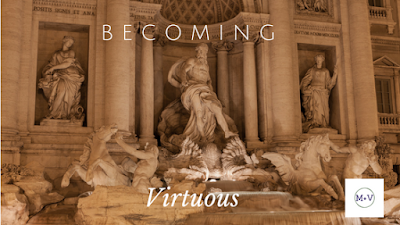Becoming Virtuous
What does it mean to be a virtuous person?
My husband and I are both very active in politics, and also share a love of history, especially of Western Civilization. We also lack the ability to read book alone (despite each loving to read very much). So when it comes to reading, we do a significant amount of it out loud to each other, while doing chores, making dinner, or driving to the in-laws'. All of this is to say that Chris has been reading 'On the Ideal Orator' by Cicero, which means, by extension, so have I.
At one point, the dialog of the characters - Cicero and his colleagues - turns to the qualities one must possess to be a good orator. This is beyond the obvious aspects of rhetoric, legal knowledge, and logic that someone absolutely must have to be a competent speaker at all. Cicero advanced that to master persuasion and truly capture the hearts and minds of the audience, one must be a virtuous person who lives out their values long before setting foot on the stage.
What this means, in short, is that to be someone that people listen to, one must become someone who is worth listening to.
In some sense, we all intuitively understand this. I can't show up to a client meeting, and expect to learn the skills I need to do the job after I have gotten the contract. A musician doesn't show up at the concert hall expecting to learn the piece now that they have arrived for the recital.
But even that misses some of the nuance of Cicero's argument. A better analogy would be to say that, in addition to attending university for a degree in marketing, and in addition to regularly reading about trends in my industry, I have also practiced timeliness, organization, honesty, and accountability. Before the musician steps out to perform, he has practiced the instrument as well as discipline, rigorous attention to detail, and musical fluency. The qualities that most make me perfect for the job are the ones that transcend my specific qualifications, and that began being rehearsed long before I had chosen a career path.
In the quest to become a person of virtue, it is not as simple as practicing a set of behaviors, or tactics. Budget your money and spend less than you earn. Read books and the newspaper to keep yourself educated. Take walks. Eat fruit. These things are just behaviors, mere tactics on the game board of life.
Tactics are important, and they may be a good place to begin, especially if you don't know where to start. Indeed, many people successfully lead lives living only in the realm of tactics, without considering the deeper strategy at play. If one has good tactical models, a search for deeper strategy may never be necessary.
But few of us have such good models, and so we are left to figure out the strategy that fills in the missing pieces.
Here is one method I have used for finding the strategy that brings together many discrete tactics into a larger way of living:
Begin with the ideal in mind, and work backward through its behaviors into the tactics. Look for patterns, and tactics that seem to coordinate (orderliness and timeliness often walk together). By reverse engineering, you can identify the underlying strategy - the Why - for each tactic, and set of tactics, and the collection of tactics as a whole. What we are looking for is enduring traits, the fundamentals, that, - with practice - become our character.
Some traits (and their excess):
Persistence - not foolhardiness
Determination - not stubbornness
Aspiration - not self-aggrandizement
Attentiveness - not fixation
Timeliness - not haste
Honesty - not brutality
Forgiveness - not forgetfulness
Organization - not obsession
Openness - not foolishness
All of these qualities should be striven for personally and professionally, but never worshiped. Each of these virtues is a vice in disguise if taken too far. Moderation, too, is a virtue.
Pursuit of virtue and virtuous life is an endless task. I am reminded constantly that nothing is totally fixed, and all things are subject to spontaneous re-upheaval at any time. It is our fate in life to chase a level of calm that cannot be permanently maintained. But even our falling short of the ultimate goal is a testament to the worthiness of that goal. It is something worth chasing, no matter how many times we fall. To practice continually is to live out your virtues.
When you carry yourself on the back of your lived-out virtues, a fall will be more readily forgiven.
We all occasionally make mistakes at work and in life. My clients have been quick to forgive, even though our relationships stretch back only a few months. My husband is perpetually forgiving me for something, and I him. It is vastly easier to forgive and overlook the error of a person trying to be their best, over the complacent human who errs but rarely, and yet is generally unredeemable. We all know the terse employee or coworker who is extremely proficient, highly effective, and yet, when her infrequent mistake happens to affect you, the injury stings a little bit longer.
Who would you rather be? Cicero would say the virtuous person, of course. As we lie in the satin repose of our final resting place, I hope we all may be looked upon by our fellow man as someone who was worthy of respect and commendation, simply for the way we lived.
To persuade with one's character allows an orator to win the argument before the debate has begun. Let all our reputations so proceed us.



Wow, that is excellent advice. Well said!
ReplyDelete